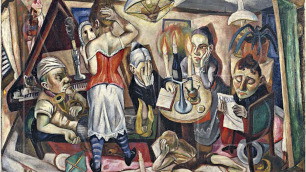| Jana: | “Hallo allerseits, and welcome to GUTS – the first German course you can't fail!” Hello Michael, how are you? |
| Michael: | Gut! I mean good. Are you ready to dive in? Because there is an old saying in German: “Deutsche Sprache, schwere Sprache.” That means even we Germans feel that the German language is a tough language! |
| Jana: | Yes! I want to make sure to tell our listeners that you should not let this intimidate you. It might feel scary, and maybe you weren't expecting that we have, for example, a ridiculous amount of pronouns… like only 11! But our goal here is to keep it simple. We call it virtual immersion, but we do it so slowly and naturally; you won’t even notice as we add more and more German to our conversation. |
| Michael: | We will basically start from the very beginning as if you are trying to check out a German car and need to learn how to drive a stick. But seriously, if you check out the lessons and take the quizzes, you will very quickly see that you can break this difficult language down to its elements and even master it. |
| Jana: | Great analogy! And it just so happens that today, we are discussing verbs because we need action! |
| Michael: | This is my favorite part. May I go ahead and explain? |
| Jana: | Yes, of course, Michael. |
| Michael: | As you know, verbs are action words. Most verbs in German end with -en. Here are some examples: diskutieren, to discuss, telefonieren, to phone someone, schwimmen , to swim, trinken, to drink. Sounds easy, right? |
| Jana: | Oh, those were great choices because they have the same root as a lot of English words. |
| Michael: | English is a Germanic Language! See how much the Germans invented? |
| Jana: | Haha, very funny. Hey, here are some other verbs that might make you laugh: Marschieren, to march, recyclen, to recycle, and… |
| Michael: | Fahrvergnügen! Haha, most likely our listeners will know that word, but it’s actually not a verb. It just means having fun driving. But it felt like you were going with some words that we Germans are well known for. |
| Jana: | Yes, we might talk a little about German stereotypes, too. We do like to keep things nice and orderly, so recyclen is a way of life in Germany. Marschieren is luckily a thing of the past. |
| Michael: | And now for the tricky part: We have to conjugate the verbs, which means the ending changes depending on who is doing the action. |
| Jana: | To give you the easiest version, we start with one where it doesn’t change: When we say we, the ending stays the same: Wir diskutieren. |
| Michael: | Ja! Und wir reagieren. And we react! |
| Jana: | Another great and easy verb! Here is a tough one: In German, the verb to conjugate, or to change the verb ending to agree with the subject of the sentence, sounds like this: konjugieren. Pay attention to how it changes here: Ich konjugiere. |
| Michael: | Ich diskutiere! |
| Jana: | Wunderbar! So the pattern is that when the subject is I, which is Ich, then the ending is -e. |
| Michael: | Ich recycle mein Papier. I recycle my paper. |
| Jana: | Oh that was nice. Let’s add a new verb to the list. Something we do here at “News in Slow German”: reading, which is lesen. |
| Michael: | So then our listeners will know, I read translates into Ich lese. As in: Ich lese die Nachrichten! |
| Jana: | Great! Now let’s introduce an important personal pronoun if you are talking to someone. If the subject is you, then the word for that is du. |
| Michael: | And then the ending changes to -st. Du trinkst Bier. |
| Jana: | Nein, du trinkst Bier, ich trinke Tee! |
| Michael: | OK! And we should also mention the most confusing and amusing version of a conjugated verb, which is when we address people in a formal way in the plural version of the verb. “Sie trinken” can mean they are drinking or you are drinking. That's why context is important to understand whether it is sie or Sie. |
| Jana: | Oh, and most Germans still love to be very formal to this day unless you go to Berlin. The majority of people outside the capital prefer to be addressed with Sie and not the more informal du. Generally speaking, most Germans love it when they notice a foreigner is really trying their best and will offer to say “du”. And to explain again: The plural form also ends like the general verb ending in -en. Sie lesen, they or you read, Sie sehen, they or you see, and so on. |
| Michael: | OK, well, I think we should end it here. |
| Jana: | What? Nein! We have to mention one more weird thing. So, in the singular third person, the verbs end the same way, no matter whether a male or female is the subject. Er trinkt, he drinks, sie trinkt, she drinks. The verb ends with a “t”. |
| Michael: | Gender equality! |
| Jana: | Well, yes and no… we have this little word man, to speak of someone in a general sense. In English, this is called impersonal you. For instance: Man sagt, die Deutschen trinken viel Bier. In this case, I was using the verb sagen, which means to say. The expression "Man sagt" means "one says" or "people say." So Man sagt, die Deutschen trinken viel Bier means “They say Germans drink a lot of beer." |
| Michael: | Oh, you are so right. I keep forgetting, but that sounds as if we are speaking of men only since it sounds exactly as the word Mann, the German word for man. |
| Jana: | Exactly, and we do use it quite often. Man diskutiert viel hier! We have a lot of discussions here! |
| Michael: | Oh Mann! |
| Jana: | Let me help translate for our listeners: Aw man! But once you understand the way it’s being used, it feels gender neutral again. |
| Michael: | Speaking of gender, I will also add one last thing: In addition to er und sie, we have es. |
| Jana: | Yes, the neutral version of a subject or condition. Es regnet – it’s raining. |
| Michael: | Or another example would be if we are talking about a baby. For the purpose of German grammar, Baby is a neuter noun: Es trinkt Milch (it’s drinking milk). |
| Jana: | Well, Michael, look back and see the many words we already learned today! Not just some very useful verbs, but some of the many pronouns and then a few things you might not have noticed hier und da. |
| Michael: | And some culturally important words like Bier! |
| Jana: | Oh danke, Michael! Thanks to your humor, this was not too dry! |
| Michael: | Ok, tschüss! |
| Jana: | Ciao! |

























